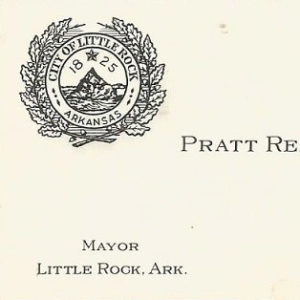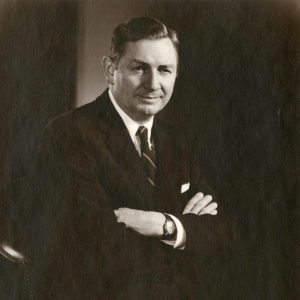calsfoundation@cals.org
Pratt Remmel (1915–1991)
Pratt Cates Remmel was a longtime Republican activist who served as mayor of Little Rock (Pulaski County) for two terms in the 1950s. The first Republican to serve in that office since Reconstruction, he was also the Republican Party’s nominee for governor in 1954.
Pratt C. Remmel was born on October 26, 1915, in Little Rock, one of five children of Augustus Caleb and Ellen Lucy Remmel. His father died when he was five, and his mother raised the children by herself. Remmel graduated from Little Rock High School in 1933 and then attended the University of Virginia in Charlottesville, where he received a bachelor’s degree in economics in 1937.
Returning to Little Rock, Remmel became involved in local politics. The Remmel family had long been active in Arkansas Republican politics, with Augustus Remmel a one-time state party chairman, while Ellen Remmel served as national committeewoman for almost thirty years. In addition, Pratt Remmel’s great-uncle, Harmon L. Remmel, was a dominant figure in the party in the 1910s and 1920s. Pratt Remmel entered the electoral arena for the first time in 1938 when he ran unsuccessfully for the Little Rock City Council. In 1940, he became chairman of the Pulaski County Republican Executive Committee, beginning a three-decade period of party leadership posts. On June 15, 1940, he married Catherine Couch (daughter of businessman Harvey C. Couch), with whom he would have three children.
During World War II, Remmel served as a U.S. Navy flight instructor, achieving the rank of lieutenant. After the war, Remmel built a successful insurance business. In 1951, he sought the office of mayor of Little Rock. To the surprise of most observers, he upset incumbent Sam Wassell, who was seeking a third term, by an almost 2–1 margin. Analysts offered a number of possible reasons for Remmel’s surprising win. Foremost among them was the city’s tradition of rotation in office. No one had served more than two two-year terms since the mid-1920s. Also, believing that Little Rock would never elect a Republican, Wassell failed to fully engage his organization. With the city’s Arkansas Gazette pushing for a new non-partisan city commission-manager form of government, the partisan nature of the election was diminished.
With his victory, Remmel became the first Republican mayor of Little Rock since Reconstruction, and he was reelected to a second two-year term in 1953. At the same time, while he was an active and unabashed Republican, serving as a delegate to the Republican National Convention in both 1952 and 1956, Remmel downplayed his party affiliation in his Little Rock electoral campaigns. As mayor, he oversaw the city’s continuing postwar growth. During his time in office, the city’s first television station began broadcasting, and planning was initiated for the city’s first modern shopping center, which was constructed in 1956.
Remmel served in leadership positions in both the U.S. Conference of Mayors and the Arkansas Municipal League. After two terms as mayor, Remmel originally planned to retire, honoring the two-term tradition that characterized Little Rock politics. Believing, however, that voters needed an alternative to Democrat Woodrow Mann, whose reputation Remmel thought was suspect, he entered the race late only to lose by fewer than 1,200 votes one of the closest races in city history.
Remmel faced the voters one other time, running as the Republican nominee for governor in 1954. While he lost to Orval Faubus, garnering only 38 percent of the vote, it was the strongest showing for a Republican since Reconstruction, and Remmel’s effort is credited by some for laying the groundwork for Republican Winthrop Rockefeller’s subsequent breakthrough victory in 1966.
Upon leaving office, Remmel stayed involved in the Republican Party but also devoted his energies to other activities beyond his insurance business. He was involved in the American Legion and the American Red Cross, serving as state vice chairman of the Red Cross, but his greatest energies were devoted to the state’s waterways. He served as a member of the Arkansas River Basin Commission, as well as chairman of Arkansas Waterways Commission.
Remmel and his family’s contributions to Little Rock and Arkansas have been recognized in many ways. Arkansas’s Lake Catherine was named for his wife—as her father, Harvey Couch, had built Remmel Dam (named for Harmon Remmel) and Carpenter Dam, which created Lake Catherine and Lake Hamilton. Remmel Park and Pratt Remmel Road in Little Rock are named for Pratt Remmel.
Remmel died on May 14, 1991, and is buried in Little Rock’s Roselawn; his wife died in 2006. He was posthumously inducted into the Arkansas River Hall of Fame in 1996.
For additional information:
Edmonds, Revis. “Community Champion and Political Pioneer: Pratt Cates Remmel.” Pulaski County Historical Review 69 (Fall 2021): 76–101.
Harris, Peggy. “Pratt C. Remmel, 75, Former LR Mayor, Dies.” Arkansas Gazette, May 16, 1991, pp. 1B, 7B.
Hathorn, Billy Burton. “Pratt Cates Remmel: The Thrust toward Republicanism in Arkansas, 1951–1955.” Arkansas Historical Quarterly 43 (Winter 1984): 304–323.
“Little Rock Look Back: Mayor Pratt Remmel.” Little Rock Culture Vulture, October 26, 2013. http://lrculturevulture.com/2013/10/26/little-rock-look-back-mayor-pratt-remmel/ (accessed December 28, 2021).
William H. Pruden III
Ravenscroft School
 Politics and Government
Politics and Government World War II through the Faubus Era, 1941 through 1967
World War II through the Faubus Era, 1941 through 1967 Remmel Card
Remmel Card  Pratt Remmel
Pratt Remmel 




Comments
No comments on this entry yet.